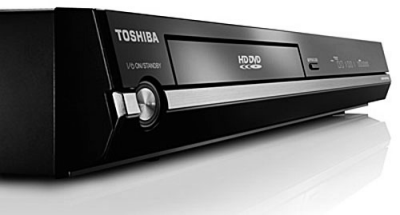I started last week’s WNR with news that my PS3 was fixed. I think I may have spoken too soon, as I’m now having problems with the wireless controller/remote. So my PS3 may be broken again, I posted earlier this week, but I may have spoken too soon, as the same problem hasn’t reoccurred yet. A lot to cover this week, so I’ll have to put my PS3 problems off for another week, until I’ve managed to replicate the problem again.
 Starting with copyright news, Wal-Mart is the latest to abandon DRM. Normally, that’s good news, but because DRM is the world’s stupidest invention, it has grave consequences for users who did not pirate music and were honorable enough to buy DRM’d music from Wal-Mart. Wal-Mart will shut down its DRM authentication servers, meaning that the DRM’d music files will no longer play. As if people needed more incentive to pirate music.
Starting with copyright news, Wal-Mart is the latest to abandon DRM. Normally, that’s good news, but because DRM is the world’s stupidest invention, it has grave consequences for users who did not pirate music and were honorable enough to buy DRM’d music from Wal-Mart. Wal-Mart will shut down its DRM authentication servers, meaning that the DRM’d music files will no longer play. As if people needed more incentive to pirate music.
And to prove how stupid DRM is again, Apple has been sued by Norway over Apple’s FairPlay DRM. DRM not only makes genuine consumers mad, it also prevents interoperability and fair competition, which is why Norway is suing. I’ve always thought DRM was more about proprietary technology and licensing fees, as opposed to piracy and all that. Sony agrees with me apparently, when the President of Sony Pictures Television said that DRM is one of the the major causes of piracy, although he has no intention of dropping it.
So not only does DRM cause consumer frustration, is anti-competitive, causes piracy, but it may also be killing Blu-ray. Apparently the prohibitive cost of implementing AACS (mainly licensing fees) means that it’s hard for independent producers may have to look elsewhere. Nearly $5,000 may be required to just publish one title on Blu-ray, and that’s for AACS licensing only. HD DVD’s specs said that AACS was optional, but the BDA insists on all Blu-ray discs to carry it, even if the content owners don’t wish to have it (so you can’t really say it’s all about copyright protection). The BDA’s insistence to push DRM onto consumers and producers equally is why I wish HD DVD had won the day, and I’m sure independent producers wished for it too.
So is piracy really that big of a deal in the movie industry? Sony, the champion of DRM and copyright control, is asking ISPs to once more become copyright cops. And yes, this is the same interview in which the Sony Pictures Television President also said DRM is a major cause of piracy and that they love DRM – therefore, they must love piracy. You know who also loves piracy? The MPAA. Despite the deteriorating economic conditions, movie ticket sales are up. Piracy is also up. So therefore, piracy helps movie ticket sales. The MPAA must be very pleased.
And following on the Spore DRM uproar, more and more gaming execs are turning away from DRM. Spore was a hit title that was always going to sell well, DRM or not, but for any other title, bad publicity caused by DRM could really just kill the title.
And finally in copyright, the big news of the week. The MPAA and Real Networks are now locked in a legal battle over the legality of Real’s RealDVD software. As reported earlier in the WNR, RealDVD is Real Networks’ “legal” alternative to DVD rippers, because it keeps the CSS encryption intact on DVDs and then add their own layer of DRM to prevent sharing of the copied movie. Despite this, the MPAA is not happy and wants RealDVD to be scrapped, and is suing Real Networks for breaching CSS licensing (again, despite RealDVD not touching CSS at all). This one will be worth keeping an eye on, as the legal decision could go either way. The way the MPAA is acting could be considered anti-competitive, not allowing a particular use of a product just because they’re not making money from it (I don’t think the MPAA is against this sort of “managed copy”, as long as they’re the ones to profit from it I suppose). And Real could have the capital to fight this all the way too. The Electronic Frontiers Foundation, champions of user rights and fairness in copyright protection, states in this article why they think the MPAA should lose this case. I’m not a fan of Real’s products, but I support them on this one 100%.
 Onto HD news now, next week will be when the Iron Man Blu-ray sales figures filter through the Nielsen VideoScan figures. Early indication suggests that Iron Man Blu-ray will be the best selling Blu-ray title of all time, but I suppose that’s not really saying much. This week’s figures include the release of The Godfather Trilogy on Blu-ray, and as expected, it gave Blu-ray sales a bump to become the second best week (I think) ever (the best week being the Transformers bump). Next week should see Blu-ray break all it’s own records, although whether it will set records in terms of sales ratio to DVDs depend on how well the DVD version sells. With DVD users like myself preferring to buy movies a few months after their initial release, and Blu-ray owners (and early adopters) generally preferring to buy all the latest releases as quickly as possible, the figures should favour Blu-ray, but we’ll have to wait and see.
Onto HD news now, next week will be when the Iron Man Blu-ray sales figures filter through the Nielsen VideoScan figures. Early indication suggests that Iron Man Blu-ray will be the best selling Blu-ray title of all time, but I suppose that’s not really saying much. This week’s figures include the release of The Godfather Trilogy on Blu-ray, and as expected, it gave Blu-ray sales a bump to become the second best week (I think) ever (the best week being the Transformers bump). Next week should see Blu-ray break all it’s own records, although whether it will set records in terms of sales ratio to DVDs depend on how well the DVD version sells. With DVD users like myself preferring to buy movies a few months after their initial release, and Blu-ray owners (and early adopters) generally preferring to buy all the latest releases as quickly as possible, the figures should favour Blu-ray, but we’ll have to wait and see.
The weird story of the week though is about HD DVD. Yes, that old thing. Apparently, HD DVD sales are still going strong, mainly due to the rock bottom prices that movies and hardware are being sold at. If anything proves that cheap will always outsell better, this is it (better in this case means a format which has a future versus one which definitely doesn’t). DVD will always outsell Blu-ray if this principle holds true, and DVD will never become a obsolete format as long as Blu-ray is alive (thanks to Blu-ray being backwards compatible with DVD). Toshiba is still not supporting Blu-ray, but they are adding PS3 technology to their TVs. I think the more accurate statement should be the PS3 using Toshiba technology, as the Cell processor that Toshiba will use in their LCD line-up is now a Toshiba owned product.
And as predicted a few weeks ago, prices for Blu-ray hardware will drop for the important holiday season. More reason not to buy a Blu-ray player until later this month or in November, December, when the sales really start. I’ll post any good Blu-ray deals I find in the usual place.
Although I’m quiet optimistic that Blu-ray will do quite well during this holiday season, mainly thanks to the major releases of Iron Man and especially The Dark Knight, it could always use a boost. Apple has always been a Blu-ray supporter, sitting on the board of the BDA, but it is strange why they haven’t announced support for Blu-ray in their computers yet. The theory is that Apple have their own plans in relation to movie distribution, and Blu-ray is not part of it (or you might even say that Blu-ray is against their plans).
Another way to promote Blu-ray may be to include the SD DVD version of the movie in the same package, like HD DVD combos (but clumsier in that you need 2 discs, but better in that the discs can be used at the same time). Disney is doing just this with the Sleeping Beauty Blu-ray version. The way I see it, if Blu-ray is to fully replace DVDs, then it will need a combo format of its own. If Blu-ray is happy to be the more expensive alternative to DVD, to exist side by side with it, then the current marketing strategy is working fine.
![]() And in gaming, Xbox 360’s with the Jasper update may (or may not be) appearing in stores already. Jasper reduces the size of the GPU to 65nm, which will help reduce heat production and improve stability.
And in gaming, Xbox 360’s with the Jasper update may (or may not be) appearing in stores already. Jasper reduces the size of the GPU to 65nm, which will help reduce heat production and improve stability.
The rumours of a “slim” Xbox 360 just won’t go away though, and there is definitely a new iteration of the 360 coming possibly early next year.
And that’s all the news for this week. I’m going to have to keep a close eye on the MPAA vs Real Networks legal battle, as I think the verdict of this case could prove quite important. If the MPAA wins, then unless they themselves come up with their own managed copy solution (which Real could then sue them for not allowing themselves to do the same thing), then the idea of a disc-less home theatre is dead. If Real wins, then we could see more and more products “circumvent” CSS legally. See you next week.





